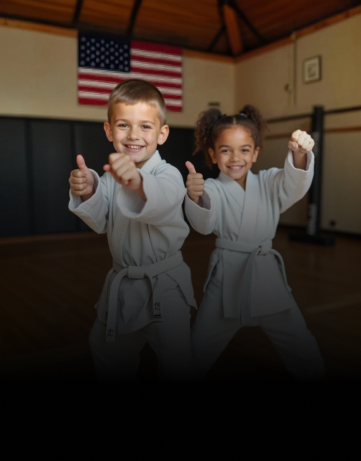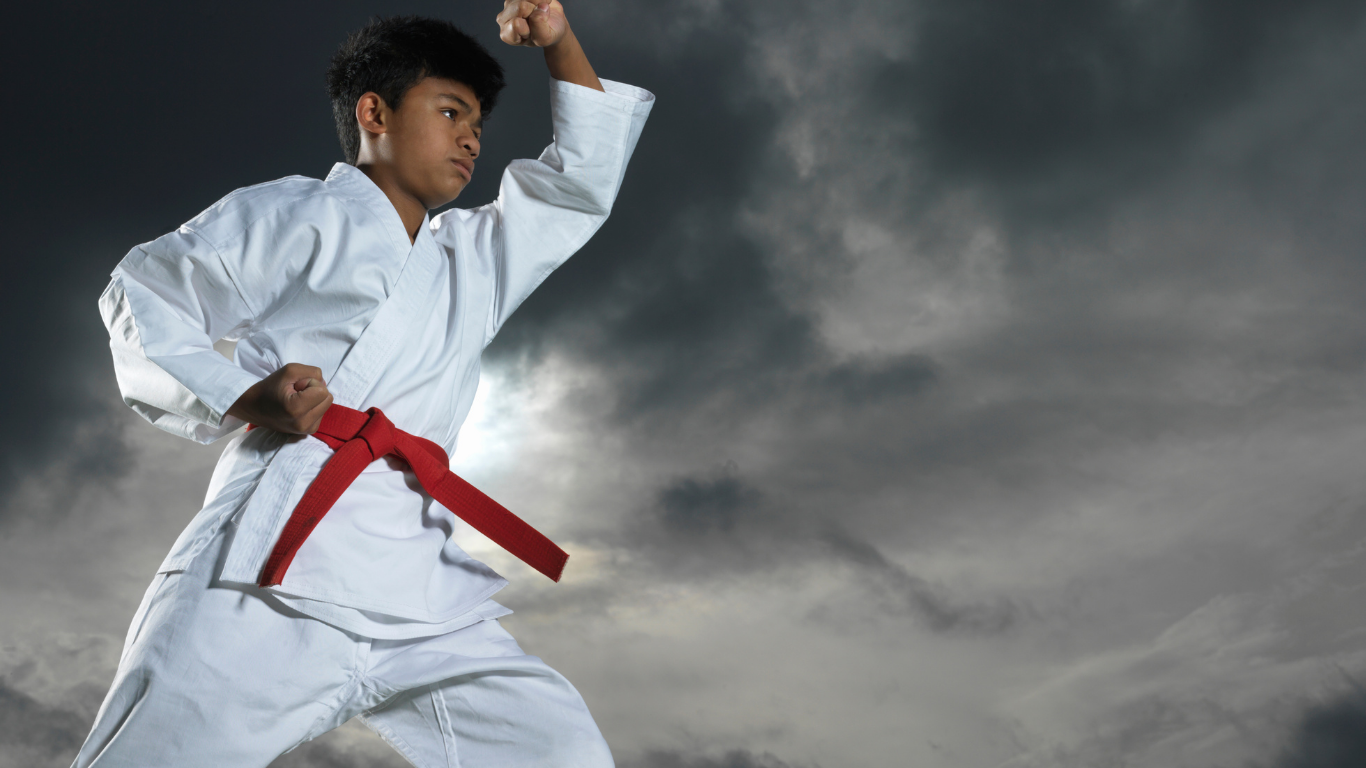Best Karate for kids – Award-Winning Programs Centered Around Respect and Resilience
Best Karate for kids – Award-Winning Programs Centered Around Respect and Resilience
Blog Article
Just How Martial Arts for Kids Can Boost Confidence and Self-control in Young Martial Artists
Karate for youngsters uses an unique chance to develop self-confidence and technique in young martial artists. As they learn new methods and face difficulties, they not just obtain abilities but also establish a strong sense of self-worth. This structured atmosphere motivates them to appreciate the trip of enhancement. But exactly how does this training equate right into their day-to-day lives? Discover the much deeper connections that make karate even more than simply a sport.
The Relevance of Self-confidence in Childhood Years Growth
Self-confidence is an essential foundation in childhood development. When you nurture your child's self-esteem, you encourage them to encounter obstacles, take risks, and express themselves easily. Youngsters with self-confidence are more happy to discover social situations and new tasks, which can bring about long lasting friendships and important experiences.Encouraging your child to tip out of their convenience area promotes durability. They learn that failing isn't completion however rather a tipping stone to success. By celebrating their success, no issue how small, you help them identify their capabilities and worth.In this journey, assistance and positive reinforcement from you play a vital duty. Whether it's with praise or merely being present, your participation improves their confidence. As they expand, this self-assurance becomes a lifelong property, furnishing them to navigate both obstacles and possibilities with a solid sense of self.
Just How Karate Teaches Self-control and Focus
Martial arts helps you develop discipline and focus via its structured training routine. As you practice mindfulness throughout each session, you'll learn to focus better both on and off the floor covering. And also, setting and accomplishing objectives in karate enhances your ability to remain committed and alert.
Structured Training Program
While you take part in karate training, you'll quickly find how a structured routine instills discipline and emphasis in young practitioners. Each course follows a details format, consisting of workouts, technique method, and sparring. This consistency instructs you to dedicate and appreciate the procedure to enhancement. As you learn techniques and types, you develop a sense of obligation for your very own progress.The organized environment encourages you to establish goals, whether understanding a brand-new belt or refining a kata. You'll find that staying concentrated throughout courses and drills develops your concentration. The discipline you cultivate in karate prolongs past the dojo, favorably influencing your schoolwork and day-to-day regimens. Each session enhances the importance of dedication, assisting you become a much more self-displined person.
Mindfulness in Method
As you exercise martial arts, you'll find that mindfulness becomes a vital part of your training. Each action needs your complete interest, assisting you remain focused on today minute. You'll find out to disregard disturbances and focus on your breathing, activities, and purposes. This increased understanding hones your reflexes and enhances your discipline.During sparring or forms, you'll discover the importance of being emotionally existing - Karate Salisbury MD. You'll discover just how this emphasis not just boosts your strategy but additionally constructs your self-confidence. By practicing mindfulness in karate, you cultivate patience and resilience, essential attributes that prolong past the dojo. This way, karate shows you to harness your mind, aiding you develop a regimented method to challenges both on and off the floor covering

Personal Goal Setting Techniques
Establishing objectives in karate isn't nearly gaining belts; it's a powerful method to grow self-control and emphasis. When you establish particular, possible targets, you create a roadmap for your development. Instead of simply aiming to improve your kicks, try focusing on understanding a certain technique each month. This method maintains you determined and engaged.Breaking down larger objectives into smaller, manageable steps aids you track your progress and commemorate tiny success in the process. Whether it's improving your stance or boosting your sparring endurance, every objective reinforces your commitment. As you achieve these goals, you'll build confidence in your skills and establish a strong feeling of technique that expands past the dojo right into day-to-day life.
Structure Strength Via Martial Arts
Fighting style, specifically karate, uses youngsters an unique chance to develop resilience in a helpful atmosphere. In classes, they deal with challenges that push their limitations, whether it's understanding a new technique or competing with a companion. Each trouble, like a missed out on kick or a lost match, comes to be an opportunity to learn and grow.As they practice, youngsters learn to accept pain and keep trying, also when things get tough. They uncover that failing isn't completion; it becomes part of the journey. This state of mind helps them bounce back more powerful, not just in the dojo, but in everyday life.With each obstacle they get rid of, your kid builds self-confidence in their capability to tackle barriers, fueling their determination. Through karate, they'll recognize that durability isn't almost physical strength; it has to do with mental grit and perseverance, empowering them to encounter whatever life throws their means.
The Function of Respect in Karate Educating
Respect is a fundamental principle in karate training, cultivating a society of technique and camaraderie amongst trainees. When you tip onto the dojo floor, you're not simply discovering techniques; you're likewise finding out to appreciate your teachers, peers, and the art itself (Karate Salisbury MD). Bowing at the beginning and end of course isn't simply a procedure; it represents your acknowledgment of others' dedication.as and initiatives you develop shared regard, you'll find it improves your learning experience. You'll pay attention more attentively to your trainer and gain understandings from fellow students. This atmosphere urges constructive objection and assistance, permitting everyone to expand together.Moreover, regard grows self-discipline. Acknowledging the worth of effort and humility assists you remain concentrated on your training. In turn, this respect equates right into your everyday life, boosting your communications and relationships outside the dojo. Through martial arts, you learn that respect is important for personal growth and neighborhood structure
Establishing Objectives and Accomplishing Success in Karate

Social Skills and Synergy in the Dojo
While training in the dojo, youngsters naturally create essential social abilities and teamwork capacities. As they practice alongside peers, they find out to interact effectively, share room, and support each other. Each course presents opportunities for collaboration, continue reading this whether it's during companion drills or group workouts. This team effort promotes friendships and develops a sense of belonging, making the dojo a nurturing environment.Kids additionally get important problem resolution skills. When they encounter obstacles, such as disputes during sparring, they find out to navigate these scenarios constructively. They practice persistence and empathy, comprehending that everyone has different toughness and weaknesses.Moreover, taking part in team activities grows a feeling of responsibility. You'll see your youngster learning to count on teammates and take obligation for their duty in a team. These experiences not just boost their martial arts journey however also equip them with social devices they'll carry right into other areas of life.

The Long-Term Perks of Karate Beyond Childhood
As youngsters expand up and shift into the adult years, the advantages of karate extend far beyond the dojo. You'll discover that the self-control and emphasis found out through karate can translate into your academic and expert life. Setting and accomplishing objectives in martial arts cultivates a solid job values, which can press you to succeed in any kind of endeavor.Moreover, the self-confidence gained from mastering techniques and sparring can improve your self-worth, assisting you deal with difficulties head-on. This durability ends up being very useful as you encounter the unpredictabilities of adulthood.Additionally, the social skills developed through team effort and friendship in the dojo can cause much better connections in both personal and professional balls. You'll learn to connect efficiently, resolve problems, and construct a helpful network.Ultimately, karate shapes not just skilled martial musicians, however well-rounded people prepared to take on the globe.
Often Asked Questions
What Age Is Best to Beginning Karate for Children?
You can begin karate as very early as age four or five, yet it typically depends on your youngster's maturation and interest. Locating a class that matches their age and power level makes a large difference.
Exist Any Type Of Health Conveniences From Practicing Martial Arts?
Yes, practicing karate deals many health advantages. You'll boost your sychronisation, strength, and versatility while increasing cardio physical fitness. And also, it boosts focus and psychological wellness, making it a fantastic choice for overall physical and mental wellness.
How Usually Should Kids Go To Karate Courses?
You must urge your kids to participate in karate classes at the very least two to three times a week. Consistency aids them find out techniques successfully and create abilities, making their experience much more delightful and gratifying in the future.
Can Karate Assist With Managing Anxiety in Children?
Yes, karate can assist handle anxiety in kids. It instructs focus and self-control while supplying a risk-free electrical outlet for power. You'll see your youngster expanding extra confident and calm as they practice on a regular basis.
What Equipment Is Required for Children Starting Karate?

Report this page